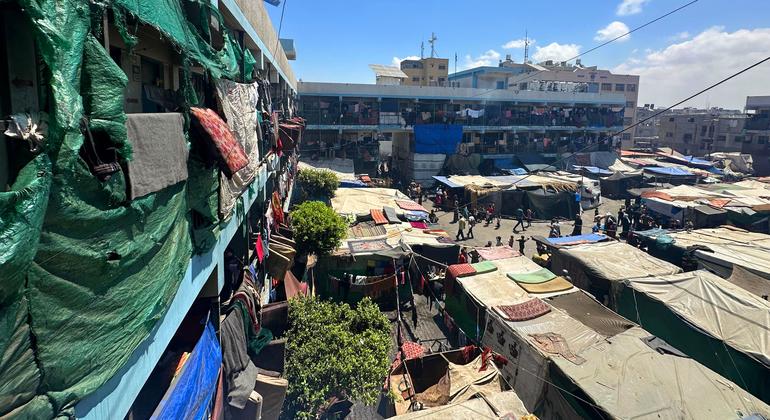Gaza: Crucial aid supplies running low as schools continue to come under attack


The United Nations Office for the Coordination of Aid said the chlorine stockpile is only enough for one month. OCHAwhile using twice as much cleaning solution is required to be effective.
OCHA noted that children are particularly at risk of waterborne diseases and the danger will increase during the winter months if Gazans continue to live in overcrowded shelters lacking clean water and adequate sanitation facilities.
Lack of everything
Shortages of hand soap, laundry detergent and shampoo, as well as lack of disinfectants continue to facilitate the spread of diseases, the UN agency added.
“Even when these products are available on the market, people cannot afford them,” OCHA said, adding that many Gazans now rely on water truck deliveries, with 22 partners currently distributing more than 7,000 cubic meters of water per day to 775 registered locations.
In a related development, humanitarians have condemned another attack on a UN school in Gaza City, the blast of which could be seen from more than 12 km away.
Wednesday’s attack was the third time the school has been hit, following attacks in December and July, according to the UN agency for Palestinian refugees. UNRWAthe operator of this facility.
The UN agency noted that a day earlier, an airstrike hit a school converted into a shelter in Gaza City. Children were reportedly killed and injured, and some burned to death, said UNRWA Commissioner-General Philippe Lazzarini.
Since Hamas-led terrorist attacks in Israel sparked the war on October 7, more than half of the schools used as shelters in the Gaza Strip have been directly hit in the fighting, according to the United Nations Children’s Fund. UNICEF.
Seven of UNRWA’s 10 schools were attacked and more than 500 people were reported killed and more than 1,700 injured despite protection under international humanitarian law.
“Once again, those seeking safety have found only death and destruction. Schools and other civilian infrastructure should never be used for military or combat purposes by any party to the conflict,” UNRWA said.
The death toll continues to rise
Health officials say more than 40,000 people have died in Gaza in the absence of a ceasefire.
In its latest humanitarian update, OCHA warned that continued displacement, including of children diagnosed with malnutrition, has made it difficult for partners to monitor children’s progress and for families to bring in enough supplies to prevent and treat the condition.
From 3 to 16 August, 26,825 children under five years of age and 12,728 pregnant and lactating women received a 30-day allocation of special nutritional supplements in Khan Younis, Deir Al-Balah and Rafah, from the United Nations World Food Programme (World Food Programme).
OCHA noted that lack of seeds, fertilizers and other livestock and crop production inputs are also hindering the restoration of local food production in Gaza.


